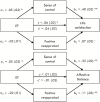Executive Function and Subjective Well-being in Middle and Late Adulthood
- PMID: 30657966
- PMCID: PMC7457179
- DOI: 10.1093/geronb/gbz006
Executive Function and Subjective Well-being in Middle and Late Adulthood
Abstract
Objectives: A growing body of research has investigated psychosocial predictors of subjective well-being (SWB), a key component of healthy aging, which comprises life satisfaction and affective well-being. However, few studies have examined how executive function (EF)-a collection of adaptive, goal-directed control processes-could affect SWB in middle and late adulthood.
Methods: By analyzing a nationally representative adult cohort ranging from the early 30s to early 80s from the Midlife Development in the United States 2 study, we examined two potential mediators (i.e., sense of control vs positive reappraisal) that could underlie the relation between EF and SWB. Further, we assessed how these mediational pathways would differ across midlife and older adulthood.
Results: Our results revealed that sense of control, but not positive reappraisal, significantly mediated the relation between EF and life satisfaction and affective well-being. Moreover, these mediation effects were significantly moderated by age, with more pronounced effects among older adults.
Discussion: We found that EF in later adulthood facilitates a sense of control over obstacles that interfere with the attainment of goals, which in turn is associated with greater life satisfaction and positive affect. This underscores the role of EF as an increasingly valuable resource that buffers against declines in sense of control and SWB in late adulthood.
Keywords: Executive function; Positive reappraisal; Sense of control; Subjective well-being.
© The Author(s) 2019. Published by Oxford University Press on behalf of The Gerontological Society of America. All rights reserved. For permissions, please e-mail: journals.permissions@oup.com.
Figures



Similar articles
-
Coping strategies mediate the relation between executive functions and life satisfaction in middle and late adulthood: a structural equational analysis.Neuropsychol Dev Cogn B Aging Neuropsychol Cogn. 2022 Sep;29(5):761-780. doi: 10.1080/13825585.2021.1917502. Epub 2021 Apr 25. Neuropsychol Dev Cogn B Aging Neuropsychol Cogn. 2022. PMID: 33899678
-
Perceived control over development and subjective well-being: differential benefits across adulthood.J Pers Soc Psychol. 2001 Sep;81(3):509-23. doi: 10.1037//0022-3514.81.3.509. J Pers Soc Psychol. 2001. PMID: 11554650
-
The Mediating Roles of Primary and Secondary Control in the Relationship between Body Satisfaction and Subjective Well-Being Among Middle-Aged and Older Women.J Gerontol B Psychol Sci Soc Sci. 2017 Jul 1;72(4):603-612. doi: 10.1093/geronb/gbv098. J Gerontol B Psychol Sci Soc Sci. 2017. PMID: 26553659
-
The influence of subjective socioeconomic status on executive functions in middle-aged and older adults.Neuropsychol Dev Cogn B Aging Neuropsychol Cogn. 2023 Jul;30(4):505-522. doi: 10.1080/13825585.2022.2055738. Epub 2022 Mar 30. Neuropsychol Dev Cogn B Aging Neuropsychol Cogn. 2023. PMID: 35354363
-
A review of the tripartite structure of subjective well-being: implications for conceptualization, operationalization, analysis, and synthesis.Pers Soc Psychol Rev. 2011 Aug;15(3):290-314. doi: 10.1177/1088868310391271. Epub 2010 Dec 3. Pers Soc Psychol Rev. 2011. PMID: 21131431 Review.
Cited by
-
The Association between Happiness and Cognitive Function in the UK Biobank.Curr Psychol. 2024 Jan;43(2):1816-1825. doi: 10.1007/s12144-023-04446-y. Epub 2023 Mar 1. Curr Psychol. 2024. PMID: 38510575 Free PMC article.
-
Brain Activity Associated with the Planning Process during the Long-Time Learning of the Tower of Hanoi (ToH) Task: A Pilot Study.Sensors (Basel). 2022 Oct 28;22(21):8283. doi: 10.3390/s22218283. Sensors (Basel). 2022. PMID: 36365987 Free PMC article.
-
Social responsibility and subjective well-being of volunteers for COVID-19: The mediating role of job involvement.Front Psychol. 2022 Oct 26;13:985728. doi: 10.3389/fpsyg.2022.985728. eCollection 2022. Front Psychol. 2022. PMID: 36389575 Free PMC article.
-
Association between subjective well-being trajectories and anxiety/depression: findings from a nationally representative cohort study.Front Psychol. 2025 Jun 27;16:1573260. doi: 10.3389/fpsyg.2025.1573260. eCollection 2025. Front Psychol. 2025. PMID: 40657580 Free PMC article.
-
The Effect of Cognitive Training with Neurofeedback on Cognitive Function in Healthy Adults: A Systematic Review and Meta-Analysis.Healthcare (Basel). 2023 Mar 13;11(6):843. doi: 10.3390/healthcare11060843. Healthcare (Basel). 2023. PMID: 36981504 Free PMC article. Review.
References
-
- American Psychiatric Association (1987). Diagnostic and statistical manual of mental disorders (3rd ed.). Washington, DC: American Psychiatric Association.
-
- Anderson P. (2002). Assessment and development of executive function (EF) during childhood. Child Neuropsychology, 8, 71–82. doi:10.1076/chin.8.2.71.8724 - PubMed
-
- Berlin H. A., Rolls E. T., & Kischka U (2004). Impulsivity, time perception, emotion and reinforcement sensitivity in patients with orbitofrontal cortex lesions. Brain: A Journal of Neurology, 127, 1108–1126. doi:10.1093/brain/awh135 - PubMed
-
- Bernecker K., Herrmann M., Brandstätter V., & Job V (2017). Implicit theories about willpower predict subjective well-being. Journal of Personality, 85, 136–150. doi:10.1111/jopy.12225 - PubMed
-
- Brim O. G., Ryff C. D., & Kessler R. C (2004). How healthy are we? A national study of well-being at midlife. Chicago, IL: University of Chicago Press.
MeSH terms
Grants and funding
LinkOut - more resources
Full Text Sources
Medical

